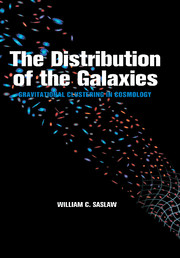Book contents
- Frontmatter
- Contents
- Prologue
- Part I Historical
- Part II Descriptions of Clustering
- Part III Gravity and Correlation Functions
- Part IV Gravity and Distribution Functions
- Part V Computer Experiments for Distribution Functions
- Part VI Observations of Distribution Functions
- Part VII Future Unfoldings
- Bibliography
- Index
Part IV - Gravity and Distribution Functions
Published online by Cambridge University Press: 19 January 2010
- Frontmatter
- Contents
- Prologue
- Part I Historical
- Part II Descriptions of Clustering
- Part III Gravity and Correlation Functions
- Part IV Gravity and Distribution Functions
- Part V Computer Experiments for Distribution Functions
- Part VI Observations of Distribution Functions
- Part VII Future Unfoldings
- Bibliography
- Index
Summary
Number counts of galaxies in cells on the sky or in space, near neighbor statistics, and distributions of peculiar velocities all enhance our understanding of how galaxies cluster. Even though they contain more information than low-order correlations, we can extend these distributions into highly nonlinear regimes where gravity dominates. General physical principles, rather than detailed orbital dynamics or models, simplify and guide these extensions.
After reviewing some basic mathematical properties of distribution functions, we examine how dynamics describes their linear evolution. As the evolution becomes more and more nonlinear, however, the dynamical arguments give out, just as they did for correlation functions. Mathematical pertubation theory becomes more intractable; its returns diminish. Nonlinearity, spreading from smaller to larger scales, destroys memories of the initial state. Formany initial conditions, nonlinear evolution can lead to quasi-equilibrium. Somewhat unexpectedly, perhaps, this is amenable to a statistical thermodynamic description. Later we will compare the predicted distributions with detailed simulations and observations.
Information
- Type
- Chapter
- Information
- The Distribution of the GalaxiesGravitational Clustering in Cosmology, pp. 247 - 248Publisher: Cambridge University PressPrint publication year: 1999
